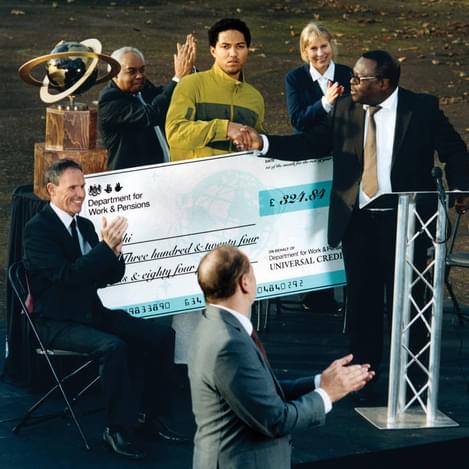Jeshi’s Universal Credit examines the ugly realities of modern Britain
"Universal Credit"

Although an early endorsement from streetwear label Places+Faces in 2017 saw him rubbing shoulders with the likes of slowthai and Kojey Radical on the brand’s inaugural mixtape, he’s since remained a comparatively undersung figure – but on debut album Universal Credit, his message needs to be heard far and wide.
Offering a stark depiction of inner-city life, the East London wordsmith expertly taps into the modern conundrum of social malaise, his unflinching lyrics touching on a gamut of hopes and fears that will resonate acutely with those struggling to find purpose or make ends meet in Tory Britain. “Sick” instantly sets the tone, finding an exhausted Jeshi chasing the distant prospect of work-life balance in late-capitalist society; by the next track, “Killing Me Slowly”, his patience is wearing tangibly thin: “Throwing my phone ‘cah it full up of phonies”, he declares, while condemning the capital’s soaring rent prices in the same breath. The visceral “Another Cigarette”, which follows, introduces the recurring motif of tobacco as escapism into the mix, its droning synth pads interrupted only by nauseating tape-stop effects. It’s a song which speaks to the challenges of navigating life with mental illness; as featured artist Fredwave reminds himself “The doctor said it’s all in my head”, the haunting inflections in his voice tell you he’s unconvinced.
Grim. But there’s little in the way of comic relief from here on out, save for some dry humour. On “Hit By A Train”, Jeshi claims that his “silver spoon got rust” and cherishes the brief respite from depressive thoughts that a temporary high can offer. He later expands on the matter of substance abuse, referencing addictions both close to home and endemic in society on the thought-provoking “Generation” – a centrepiece of sorts for the album which forensically examines the hurdles faced by young adults today and the vices they sedate themselves with. “Violence”, which sees Fredwave and Obongjayar both reprising their roles as guests, offers some further clues as to why Jeshi feels the need to self-medicate, detailing the pervasive, PTSD-inducing consequences of witnessing street crime as a youth. The beats beneath him are fit to match these sombre subjects at every turn, drawing on a rich palette of evocative pianos, unintelligible vocal cuts, nostalgic two-step shuffles and arpeggiated guitars.
Thankfully, there are glimmers of happiness throughout the LP, although they’re unapologetically few and far between. “Two Mums” is a bittersweet tribute to the mother and grandmother who raised him, championing the maternal figures in his life without shying away from the hardships they faced including prison visits and overcrowded housing. Bringing it all together in a stroke of genius, closing track “National Lottery” crystallises the project’s key themes, ultimately underscoring the importance of hanging onto hope against all odds. Reeling off fond childhood memories of kids’ show Art Attack, video rental chain Blockbusters, and the music of Limp Bizkit, Jeshi recalls entering the weekly sweepstakes with the dream of winning it big: “Lucky dip, six numbers and I’m rich”. As he’s made pointedly obvious over the past 38 minutes, the state isn’t offering a viable route out of poverty – so why not roll the dice?
Get the Best Fit take on the week in music direct to your inbox every Friday



